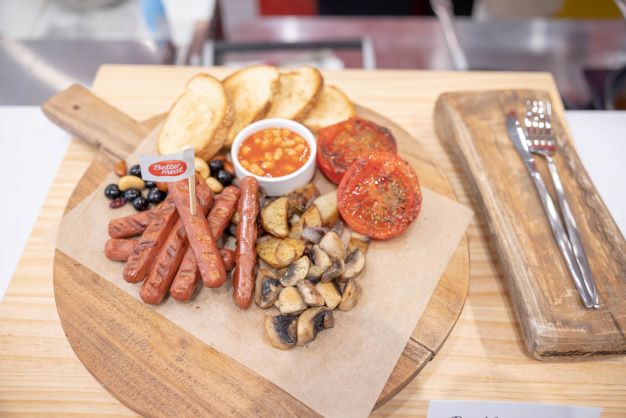Over the course of the year, plant-based offerings as an alternative to meats have gained ground in grocery stores, with Kroger, Walmart, Wegmans, Harris Teeter, and more investing in these specialty foods.
“We are very excited to have unMEAT fish-free Tuna available in Harris Teeter stores, making plant-based, shelf-stable protein more accessible to Americans,” said Gregory Branzon, COO of Century Pacific Group, parent company of Unmeat, in a statement. “We hope that with a budget-friendly option easily found at their regular grocery store, more consumers will opt to incorporate more plant-based meals in their diet.”
Innovations in the plant-based category continued during the past year with the introduction of new types, like plant-based steak and the development of new categories.
In a panel discussion about plant-based meat at the Plant Based Food Expo in NYC this September, Kate Holstrom, director of business acceleration at 84.51, Kroger’s data science arm, and Meghan Barton, category manager at Kroger, explained that the plant-based shopper is more responsive to innovation than others. Holmstrom said that the general pathos of these shoppers is “don’t bore me with plant-based options.” The responsiveness to innovation may have necessitated unique takes on meat alternatives in this space.
Despite the growing interest in plant-based, McDonald’s pilot of the McPlant Burger fell flat this summer.
Peter Saleh, an analyst from BTIG, a global financial services firm, indicated that the franchisees said sales of the McPlant were disappointing, either just hitting the low end of projections, or coming in too low.
Sustainable Practices in Specialty Food
The trend toward incorporating upcycled ingredients into new food products continued to gain momentum, as more companies sought to increase their sustainability efforts and minimize waste.
Food products featuring upcycled ingredients have been repeatedly cited in recent years by SFA’s Trendspotter Panel, and more and more products made from recycled ingredients have appeared at the Fancy Food Shows, from snack foods to enhanced beverages.
This year, an allergen-free pie crust made from upcycled brownie trimmings, called Killside Lane Farm Chocolate Brownie Pie Crust, won a New Product sofi Award.
ReGrained, an upcycled food company that rescues the grain created when beer is brewed and upcycles it into SuperGrain+ flour, found that interest in its products has grown, particularly from established businesses.
Another company active in the space, Renewal Mill, has also seen success in the past year. One of the company’s founders, Caroline Cotto, was a member of this year’s SFA 12 Under 35: Breakout Talent to Watch.
“We need to educate consumers on what upcycled food is and how purchasing it can combat food waste, climate change, and other global problems,” Cotto said.
In addition to upcycled foods seeing support, cultivated meats, meats grown in a lab without harming animals, inched closer to market this year. Upside Foods, a food tech brand, announced in November that it became the first company to receive a “No Questions” letter from the FDA for cultivated meat, poultry, or seafood, signaling that the administration has deemed the product safe to eat. The letter was issued following an evaluation process.
“This milestone marks a major step towards a new era in meat production, and I’m thrilled that U.S. consumers will soon have the chance to eat delicious meat that’s grown directly from animal cells,” said Upside Foods founder Dr. Uma Valeti.
Cultivated meat is uniquely positioned so that it requires approval from both the FDA and the USDA before it can be sold in the U.S., however, the FDA’s approval was a win for companies worldwide hoping to go to market in the country.
Related: TikTok Food Trends Take Hold; Supply Chain Suffers, Improves Throughout Year
Image: Plant Based Food Expo

